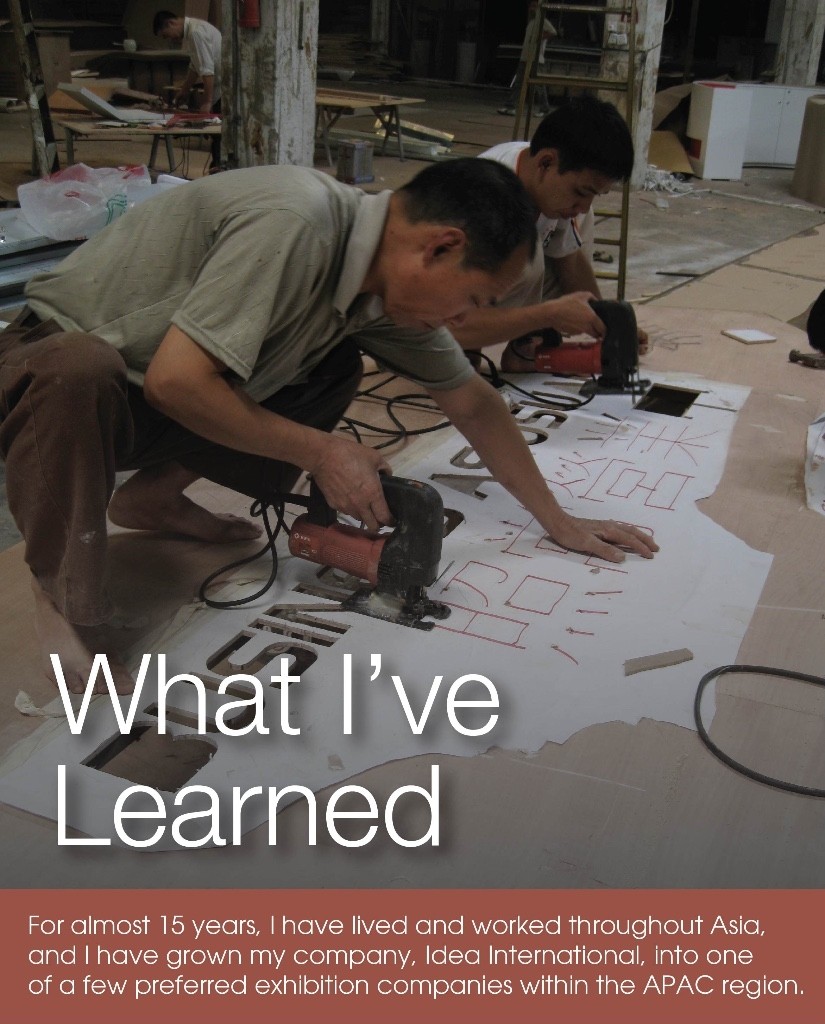
Growing up in Iowa, I never in my wildest dreams thought I’d be living in Osaka with my wife and two kids, but here I am. And, like anyone who has set up his own company—and as an ex-pat, at that–I have learned a thing or two along the way, especially when it comes to working relationships and finding partners.
Overall, general knowledge of the APAC region–a basic understanding of the culture, where to visit, where to eat–are all good if you are going on vacation. (One of these days I hope to visit my adopted part of the world as a tourist! But if you’re working trade shows or events, you need to know how to work in each specific country. Japan is different from China, just as Kyoto is different from Shanghai.
I’d like to share my top pieces of advice when vetting a partner to help with your international program.
1. Publications and associations. Do a little research and use industry “go to” publications like Exhibitor Magazine or associations like EPDA or IFES. These resources will help you gain an immediate understanding of how trade shows work in any given country.
2. There is no such thing as a stupid question. Ask about everything. Your potential partner should have specific knowledge and experience in your industry. Knowing the shows in major industries like healthcare, technology and gaming is critical, and often knowing a country’s regulations in a specific industry is vital to the success of your show. Many shows now have industry “circuits,” shows that travel through each region of the world in a calendar year. Ask for specific examples, photos and or case studies showing work the company has done. What are some of the challenges? What is done well and not so well in a particular country?
3. Labor. The labor situation is different from country to country. Some places have unions, some have different classes of labor—skilled and unskilled. In some countries workers have fixed hours, in others, workers simply keep going until the exhibit is finished. Your potential partner should know the labor situation in the country where you are exhibiting.
4. Rules, taxes and just plain unique costs. In the US everyone is familiar with the infamous drayage system, but how about performance bonds, engineering endorsements, refuse/recycling fees? Each country in the APAC region is unique in this regard, and I have had to learn what these costs are, country by country, so my clients don’t have any surprises. Study the manual very, very closely. If it’s not in the manual, ask. No booth cleaning offered? No badge scanners? No rigging? Simply ask or have your partner do the leg-work and find out.
5. Design and materials. Not every design from North America—or even Europe—works in APAC countries. Many countries use a “build and burn” model, which makes it pretty crazy for exhibitors to ship properties across continents. And then there are restrictions that are the result of local laws: in Japan earthquake regulations and insurance liabilities make rigging prohibitive, although inflatables are allowed and popular. Most exhibits used in Europe have raised floors; in Japan raised floors are not used but in China and many other places they are. Korea and Japan use wallpaper rather than laminates. We often show people samples of the materials we use— roll paint, wall paper, laminates and the carpet that can be far cry from what North Americans are used to (but it adds a local flair). Your partner might not have the exact type of laminate you want, but they should be able to offer something close.
6. Transparency. If there is any one quality you need in a partner, it is transparency. Your partner should be open and willing to be pro-active, to point out potential problems and to be honest—to tell it like it is. Personally, I’ve gotten burned several times when a supplier said everything was OK, no problem–only to learn later that there was a problem and the time to address it had become a critical consideration. The culture of “saving face” is an integral part of the Asian mindset, and saying “no” is an embarrassment. Press your partner with questions. Ask for solutions. Asians are very deferential to those in authority, and this attitude plays a major role in the way you do business together. Each country has its own unique way of approaching a problem and coming up with a solution, but your partner should be open about the ability to bridge the gap between East and West.
After 15 years, I’ve learned to love and appreciate this part of the world. It’s certainly not Iowa, but the people are charming, polite and friendly. And it’s a great place to build and expand a business.


Comments are closed.